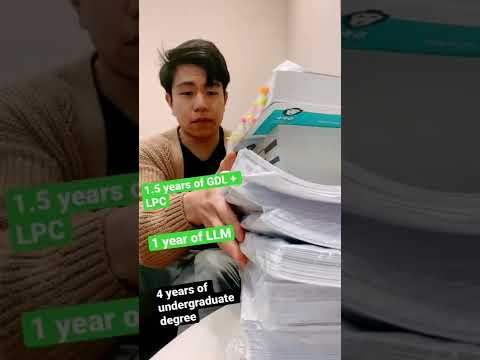
The Road to Becoming a Lawyer in London: Navigating the Challenges
Welcome, readers, to this informative article on the journey towards becoming a lawyer in the captivating city of London. As you embark on this path, it is crucial to remember that the information provided here serves as a general guide and should always be cross-referenced with reputable sources or sought from legal advisors. Now, let us delve into the intricacies of this challenging yet rewarding profession.
Becoming a Lawyer in London: Navigating the Path to Legal Practice
Becoming a Lawyer in London: Navigating the Path to Legal Practice
📋 Content in this article
Are you considering a career in law? London offers a wealth of opportunities for aspiring legal professionals. However, the journey to becoming a lawyer in London can be complex and challenging. In this article, we will explore the path to legal practice in London and provide you with a comprehensive guide on how to navigate the challenges along the way.
1. Educational Requirements: The first step towards becoming a lawyer in London is obtaining a law degree. In the United Kingdom, there are two main types of law degrees: LLB (Bachelor of Laws) and GDL (Graduate Diploma in Law). The LLB is a three-year undergraduate program specifically designed for students who want to pursue a career in law. On the other hand, the GDL is a one-year program that allows graduates from non-law backgrounds to convert their degree into a qualifying law degree.
2. Legal Practice Course (LPC): Once you have obtained your law degree or GDL, the next step is to complete the Legal Practice Course (LPC). The LPC is a vocational course that provides aspiring solicitors with the practical skills and knowledge required for legal practice. It covers areas such as litigation, conveyancing, and professional conduct. Completion of the LPC is mandatory for those who wish to qualify as solicitors in England and Wales.
3. Training Contract: After completing the LPC, you will need to secure a training contract with a law firm. A training contract is a two-year period of recognized training that allows you to gain practical experience under the supervision of qualified solicitors. During this time, you will rotate between different departments within the firm, such as litigation, corporate law, and real estate, to develop a broad understanding of legal practice.
4. The Solicitors Qualifying Examination (SQE): Starting from 2021, the
Navigating the Path to a Legal Career: Overcoming Obstacles on the Road to Becoming a Lawyer
The Road to Becoming a Lawyer: Navigating the Challenges
Embarking on a legal career is undoubtedly a challenging and rewarding journey. However, it is essential to understand the obstacles that lie ahead and how to navigate them successfully. In this article, we will explore the key challenges that aspiring lawyers may face along their path and offer insights on how to overcome them.
1. Education and Qualifications:
One of the first hurdles on the road to becoming a lawyer is obtaining the necessary education and qualifications. In the United States, aspiring lawyers must typically earn a Juris Doctor (J.D.) degree from an accredited law school. This involves completing a rigorous academic program that includes courses in various legal subjects, such as constitutional law, contracts, criminal law, and civil procedure.
2. Bar Examination:
After completing law school, aspiring lawyers must pass the bar examination in the state(s) where they wish to practice. The bar exam is a comprehensive test that assesses the candidate’s knowledge of legal principles and their ability to apply them effectively. It is crucial to prepare thoroughly for this challenging exam.
3. Networking and Internships:
Building a professional network and gaining practical experience are vital components of a successful legal career. Networking allows aspiring lawyers to connect with established professionals, mentors, and potential employers. Internships provide valuable hands-on experience and help develop essential skills.
4. Job Market:
The legal job market can be highly competitive, especially for entry-level positions. It is essential to be proactive and persistent in pursuing job opportunities.
Title: The Road to Becoming a Lawyer in London: Navigating the Challenges
Introduction:
Becoming a lawyer in London requires dedication, perseverance, and a deep understanding of the legal profession. With its rich legal history and diverse legal system, London offers aspiring lawyers a multitude of opportunities and challenges. In this article, we will explore the key steps and obstacles one may encounter on the road to becoming a lawyer in London. It is essential to note that laws and regulations can change over time, so it is always important to verify and cross-reference the content of this article to ensure its accuracy and currency.
1. Academic Requirements:
The journey to becoming a lawyer in London begins with obtaining the necessary academic qualifications. Aspiring lawyers must complete an undergraduate law degree (LLB) or a non-law degree followed by the Graduate Diploma in Law (GDL). These programs provide students with a solid foundation in legal principles, research skills, and critical thinking.
2. Legal Practice Course (LPC):
After completing the LLB or GDL, aspiring lawyers must undertake the Legal Practice Course (LPC). The LPC is a vocational course that focuses on developing practical skills required for legal practice. It covers areas such as drafting legal documents, advocacy, legal research, and client care. Completion of the LPC is mandatory for those aiming to become solicitors in England and Wales.
3. Training Contract (Solicitors) or Pupillage (Barristers):
To qualify as a solicitor, one must secure a training contract with a law firm. Training contracts typically last for two years and provide aspiring solicitors with hands-on experience in various areas of law. During this period, trainees work under the supervision of qualified solicitors and gain practical knowledge that complements their academic training.
On the other hand, individuals aspiring to become barristers must undertake pupillage. Pupillage is a one-year apprenticeship with a barristers’ chambers.
